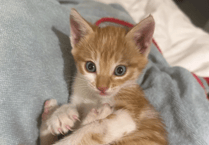In the summer of 1944 Kathleen Oates - a Wren assigned to the Women's Royal Naval Service during the Second World War- was transferred to the Isle of Man. During her time on the island, she wrote dozens of letters to home which provide a unique commentary on the operations at Ronaldsway and what life was like on the Isle of Man 80 years ago. Her daughter, CHRISTINE SMITH, pores through her mother’s letters as part of a series of columns based on Kathleen Oates’s writing...
This week 80 years ago, on Saturday, October 28, Kathleen Oates was frustrated to find herself writing from sick bay.
She reckoned she fell ill after being chilled at the Castletown Camp music circle the previous week: ‘I was frozen through. Everyone was cold - and then we came back to camp on the transport, which was also cold!’
Since then, she fought off a cold, spending all her off-duty time in bed, so it was deemed necessary to transfer her out of the cabin at the weekend.
‘It’s very nice here – I had a hot bath on arrival, then into bed with two hot water bottles.
‘There are two more Wrens in – one with tummy trouble, the other with scalded legs…This is quite a small ward – it has 12 beds.
‘We’ve a radio, plenty of books - and the VADs are very sweet nurses, all young and no grumpy sisters.’
VAD stood for the Voluntary Aid Detachment, which was a voluntary unit of civilians providing nursing care for military personnel in the United Kingdom.
Throughout the week, Kathleen ran a high temperature, which was treated with ‘tepid bed baths and cold head compresses’; no analgesics seem to have been given as Kathleen did not mention aspirin, although she referred vaguely to being given ‘tonic and cough medicine’.
Kathleen felt far from isolated from the rest of the camp: ‘This place is on the sea front – unfortunately I can’t see the sea whilst in bed.
‘During the day I hear the Barracudas taking off and see them flying past the windows whilst in the circuit before landing.
‘There’s a continual drone immediately overhead when exercises are beginning or finishing.’
Kathleen now appreciated her Isle of Man life so much that she found she was missing a lot by being out of action.
An interesting outing at work was planned, which she would miss: ‘I’m very annoyed at being in sick bay this weekend because a group of us were going over to one of the destroyers with which our planes exercise – and I was going too.
‘It would have been so nice to go aboard again – all the other girls haven’t set foot on a ship, being FAA ratings.’
She also would miss seeing her ‘almost ex’ boss, Lieutenant Whiteaker, who would be transferred elsewhere very shortly.
‘I was going out with him on Wednesday evening but it poured down so heavily that we decided to call it a day. He is still doing the Lieutenant Commander’s job – as we don’t see him in the Ops room any more.’
This was the last time Lieutenant Whiteaker was mentioned in her letters home, although they did continue to correspond for the rest of her time in the Isle of Man and also after that – until he visited her in Leicester after the war.

Decades later, Kathleen still keenly felt the social rejection she received from her former boss and possibly potential boyfriend, when she recalled that he visited her once in her family home in the late 1940s, where the Oates family lived above the shop, and thereafter did not contact her.
Such an attitude was typical of the 1940s.
Linked as it was to the Navy, which was then considered to be, and indeed called, the ‘Senior Service’, the Women's Royal Naval Service, or Wrens, was more likely than the other services to attract middle-class women.
In her civilian life, Kathleen’s family lived on the ‘wrong’ side of Leicester; her father was a vendor of cooked and fresh fish, and she was a scholarship girl in a grammar school, with mostly middle-class girls.
Although unquestionably extremely happy in the Wrens, Kathleen did encounter the general snobbery of that era.
This is why she requested that when her family wrote reusing envelopes from their supplier, as was the general custom to save paper in the war, that they should stick the label over the part which said ‘wholesale fish merchants’, so that it couldn’t be seen.
Sadly, Kathleen knew that she could not rely on being accepted for who she was, and did not divulge her background at the time to fellow Wrens and colleagues.
The letter ended on a more positive note. While she was in sick bay, her friends came to see her, bringing mail and taking her letters, so her correspondence didn’t flag.
‘The two Janes came to see me Sunday night – cheered me up. I’m expecting them this evening to bring my clean pyjamas and any post.’




-(1).jpeg?width=209&height=140&crop=209:145,smart&quality=75)